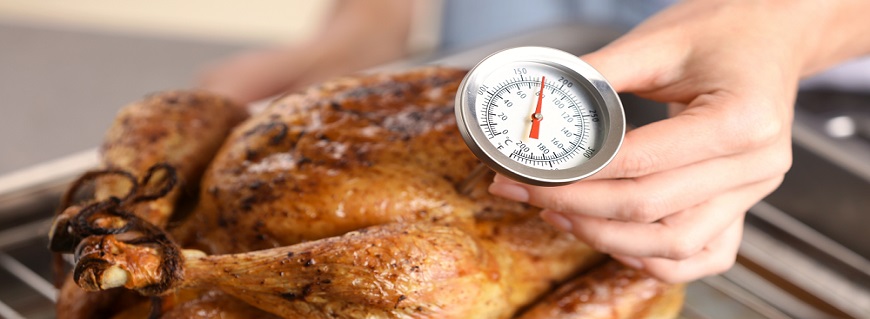
As you fire up the grill and get ready for some outdoor fun, the Health Department has tips to help you BBQ and picnic safely to prevent food borne illness from spoiling your day.
Perishable foods should never be thawed on the counter or in hot water and must not be left at room temperature for more than two hours. There are safe ways to thaw food:in the refrigerator, in cold water, and in the microwave.
- Harmful bacteria usually grow in the "danger zone" between 40° and 140° F, so keep meat and poultry in the refrigerator until you are ready to cook it on the grill. Marinate it in the refrigerator too. Throw out marinades and sauces that have touched raw meat juices, which can spread germs to cooked foods. Use clean utensils and a clean plate to remove cooked meat from the grill.
- When transporting food to another location, use an insulated cooler with ice to keep it at 40°F or below. Everything should stay chilled until immediately before it will be cooked or consumed. Keep the insulated cooler out of the direct sun and avoid opening the lid too often. It helps to keep beverages in a separate cooler.
- As always, cleanliness is essential to prevent food-borne illness. Wash hands, surfaces and utensils frequently with soap and water.
- Never use the same plate, cutting board or utensils for cooked food that you used for raw meats and poultry. Bacteria in the juices of raw meat and poultry can contaminate safely cooked food.
- Meat and poultry cooked on a grill browns very quickly but may not be cooked inside. Always use a food thermometer to be sure the food has reached a safe internal temperature hot enough to kill harmful germs.
- 145°F – whole cuts of beef, pork, lamb, and veal
- 145°F – fish
- 160°F – hamburgers and other ground beef
- 165°F – all poultry and pre-cooked meats
- After cooking, keep meat and poultry at 140°F or warmer until eaten. If fully cooked meats need to be reheated, grill them to 165°F.
- Refrigerate any hot or cold leftovers promptly in shallow containers. Discard any food that is left out for more than two hours after cooking, or one hour if outside air temperature is above 90°F.
Resources:
- USDA Meat and Poultry Hotline: (888) MPHotline (888-674-6854)
-
Barbeque and Food Safety (CDC)
Watch out for these foodborne illnesses:
Listeria infection is a foodborne bacterial illness that can be very serious for pregnant women, people older than 65 and people with weakened immune systems. It's most commonly caused by eating improperly processed deli meats and unpasteurized milk products. Healthy people rarely become ill from listeria infection, but the disease can be fatal to unborn babies, newborns and people with weakened immune systems. Prompt antibiotic treatment can help curb the effects of listeria infection.
Campylobacteriosis, an infectious bacteria, is the most common bacterial cause of gastroenteritis worldwide. Symptoms generally start between 2-4 days after exposure and include diarrhea, cramping, stomach pain, vomiting and fever. Campylobacter is often spread through undercooked poultry, but can also be found in other contaminated food and water.
E. coli 0157, a virulent bacteria, primarily affects children, causes severe gastrointestinal symptoms, and can result in kidney failure. It is spread primarily through undercooked hamburgers, but cases have resulted from unpasteurized apple cider and other foods.
Cyclospora, a parasitic disease prevalent in developing countries, causes severe diarrhea and significant weight loss. It was first identified in an outbreak in Westchester County in 1995. Since that time, several outbreaks of disease were traced to raspberries from Guatemala. Disease control experts from the Westchester County Department of Health worked with Centers for Disease Control and Prevention epidemiologists to help track the disease source and bring the outbreaks under control.
Often, the source of these bacterial and parasitic diseases are fruits and vegetables imported from developing countries with inadequate sanitation. They cause diseases not commonly seen in this country. Other sources are closer to home and are caused by unsanitary conditions in the meat and poultry industry and overuse of antibiotics in animal feed. Each case of foodborne illness requires intensive follow-up by public health staff in disease control and environmental health services.
Learn more about specific foodborne illnesses from the Center for Disease Control (CDC) Website:
